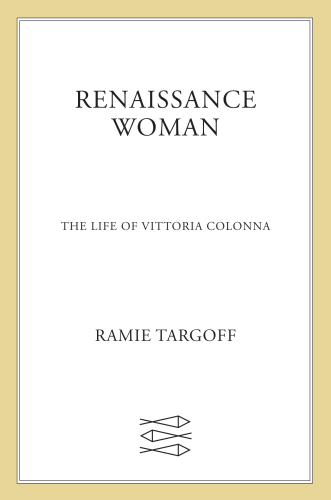
Renaissance Woman
The Life of Vittoria Colonna
- اطلاعات
- نقد و بررسی
- دیدگاه کاربران
نقد و بررسی

December 11, 2017
Targoff (Common Prayer), professor of English and cochair of Italian studies at Brandeis University, paints Vittoria Colonna (1492–1547) as an embodiment of the Italian Renaissance in this enjoyable narrative, noting Colonna’s intense religiosity and role as the first published female Italian poet. Humble despite her family’s high stature, Colonna was shocked when her literary work was published. But her romantic paeans to her late husband and religious sonnets encouraged other women to publish and inspired established male poets to ask for her elegant literary critiques of their work. Targoff provides several helpful translations of Colonna’s poems, accompanied by clear explications of her struggles with mourning and spirituality, which her letters also documented. Like her poetry, Colonna’s life centered on both the secular and the sacred; her friendship with Michelangelo and occasional political involvement contrasted with her frequent convent stays. Colonna also became part of the failed Catholic reformation movement; as a result, the Vatican compiled Inquisition documents listing her “heretical beliefs.” The unpublished documents and other contemporary sources Targoff presents, along with lines from the sonnets, illuminate Colonna’s reformist tendencies. Targoff’s well-researched, thoughtful biography reveals Colonna as a complex woman who turned grief and a spiritual quest into a renowned literary reputation. Illus. Agent: Jill Kneerim, Kneerim & Williams.

January 1, 2018
The granddaughter of Federico da Montefeltro (the famous broken-nosed condottiero portrayed in profile by Piero della Francesca), Vittoria Colonna, Marchesa of Pescara was by family, friendship, or patronage affiliated with almost every significant figure of the Renaissance. In addition to popes and emperors, she included in her circle the poet and humanist Pietro Bembo, authors Pietro Aretino and Baldassare Castiglione, who dedicated Il Cortegiano to her, and Queen Marguerite of Navarre. Most celebrated was her profound but platonic relationship with Michelangelo. Colonna was a fine poet in her own right and the first woman in Italy to publish her own Rime. She also presented Michelangelo with a manuscript of her spiritual sonnets. Deeply devout throughout her life, she supported reformers within the Catholic Church, eventually evolving views not inconsistent with Lutheranism. Targoff (English & Italian studies, Brandeis Univ.), the author of books on John Donne, the language of devotion, and the theme of Eros and the afterlife in Renaissance English, fills a profound gap, providing the first modern biography of this remarkable person. VERDICT Targoff's efforts are both spritely and scholarly in this book to be enjoyed by any literate reader.--Thomas L. Cooksey, formerly with Armstrong Atlantic State Univ., Savannah
Copyright 2018 Library Journal, LLC Used with permission.

January 1, 2018
"The Renaissance comes to life anew" in this insightful biography of a remarkable Italian woman."It is impossible to imagine the Renaissance without her." Targoff's (English, Italian Studies, Humanities/Brandeis Univ.; Posthumous Love: Eros and the Afterlife in Renaissance England, 2014, etc.) claim regarding the importance of Vittoria Colonna, Marchesa of Pescara (1490-1547), is a lofty one, but she makes a strong case for it in this thorough and painstakingly researched academic biography. Due to the paucity of extant primary sources about and by Vittoria, Targoff draws upon the complex history of the times and some considered speculation to tell her subject's compelling story. The author has done yeoman's work scouring Italian libraries, archives, and monasteries to locate, identify, and personally translate obscure Latin and Italian manuscripts. The Roman Colonna family was one of the most powerful in Italy, and Vittoria was well-educated and devout. She and her future husband, Ferrante, from Naples, were just children when their marriage was arranged around 1495; they took their vows in 1509. When her husband, a soldier fighting for Charles V, was killed in battle, she was "thirty-five years old, a widow, and childless." Targoff describes her as a solitary woman. She wanted to enter a convent, but Pope Clement said no. Disappointed, she returned to the family castle on an island where she "transformed her sorrows into verse." Her more than 130 sonnets about her grief and faith, Targoff argues, "broke entirely new ground for women's poetry." When a pirated edition of her poems was published in 1538, she became the first Italian woman to publish a book of poetry and the "most celebrated religious poet of the era." She later became friends with the influential religious reformer Reginald Pole and Michelangelo, "my most singular friend."Targoff captures the Renaissance's "simultaneous magic and strangeness" in a single woman.
COPYRIGHT(2018) Kirkus Reviews, ALL RIGHTS RESERVED.

March 1, 2018
Vittoria Colonna was a pious sixteenth-century noblewoman and heiress to a Neopolitan fortune. Widowed and childless at 32, she spent the remaining 22 years of her life devoted to religion and poetry, becoming the first woman in Italy to publish a book of poems. Targoff was first drawn to Colonna because of her verse, but quickly discovered that this Renaissance woman's influence reached far beyond the literary world (though there, too, she held sway, encouraging the aristocratic Baldassare Castiglione to publish his highly regarded etiquette guide, The Book of the Courtier). Colonna was an important figure during the Sack of Rome, and she was a dear friend of Michelangelo. As a devout Catholic, she received unique privileges from the Church, such as permission to build a private chapel in her home and have a priest at her disposal, and she exercised distinctive influence, such as when she encouraged the pope to welcome back to Rome a sect of exiled monks. Targoff's biography shows how Colonna's commitment to the Catholic Church intersected with her participation in cultural and political transformation.(Reprinted with permission of Booklist, copyright 2018, American Library Association.)




دیدگاه کاربران